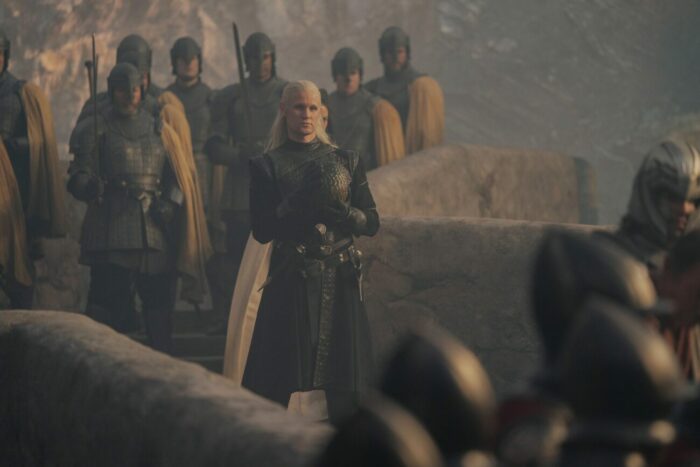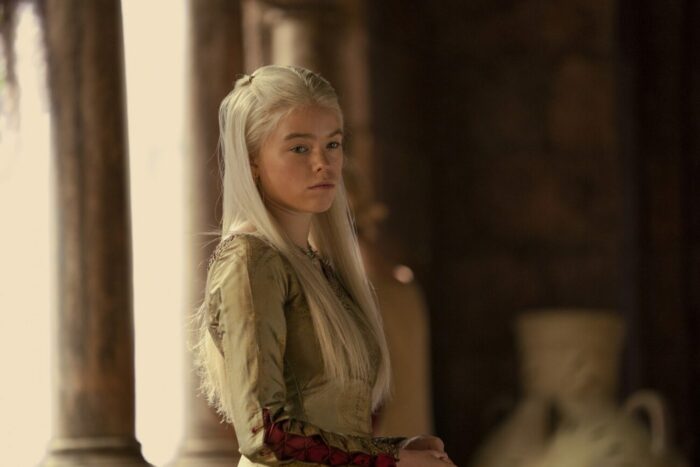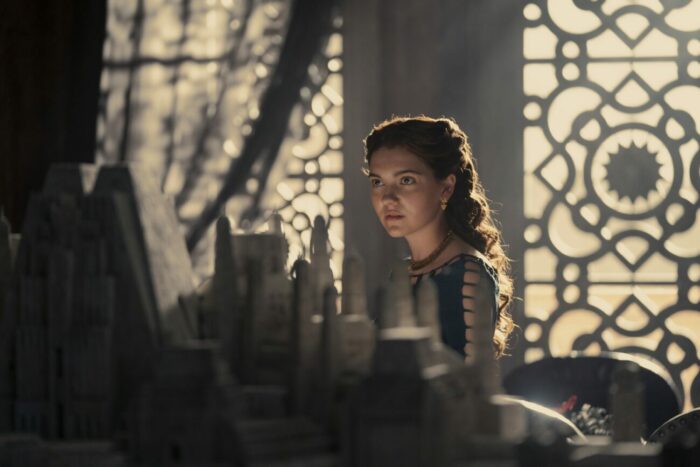The following contains spoilers for House of the Dragon S1E2, “The Rogue Prince” (written by Ryan J. Condal & George R.R. Martin and directed by Greg Yaitanes)
Why are we interested in House of the Dragon? For hardcore George R.R. Martin fans the answer is clear enough, but what about the rest of us who got swept up in the cultural phenomenon that was Game of Thrones before lamenting how bad the end of it was? Why are enough of us interested in watching a prequel show set about 200 years prior to those events that last week’s premiere reportedly set viewership records? Do we just want to be disappointed again?
Perhaps I shouldn’t speak for so large a swath of TV viewers, but focusing just on myself I still wonder. I’ve written at length about how Game of Thrones didn’t just turn bad from the point of view of quality television, but became politically pernicious in its themes. And yet, I couldn’t help myself. I had to see what House of the Dragon was all about.

At the end of Episode 1, I found myself thinking that it was rather impressive how the show had managed to keep me fairly entertained while at the same time not making me feel invested in any of the characters whatsoever. I literally do not care what happens to these people beyond the fact that I want to give most of them a haircut.
I hoped that this would change with S1E2. I had my eye on Sonoya Mizuno’s Mysaria, both because I am a fan of Mizuno’s past work and because I was intrigued by her all too brief appearances in S1E1. Unfortunately her scenes in S1E2 instead strike me as rather exemplary of the worst tendencies of House of the Dragon—to characterize women only through their suffering. Daemon has used her as a prop and rather than being portrayed with any real depth when she complains about it, Mysaria comes across as needy and rather dull. Plus her accent is almost as atrocious as Matt Smith’s wig (and I want to be clear I blame the show creators for this, not Mizuno).
In short, this show is not good by the lights of any standard that would involve something like novelty or insight into the human condition, and I don’t see any way for it to truly become good in that sort of way moving forward. Whereas Game of Thrones at its best subverted long standing fantasy tropes to suck a broader audience into a grand and nuanced story (before it betrayed all of that in its final season or so), House of the Dragon leans in on really worn tropes like the King who can’t have a son and the girl who can’t be a warrior because she’s a girl.
But for all of this, I’m entertained.

It’s maybe worth noting that the moments that have affected me the most emotionally in the first two episodes of House of the Dragon have been when that good old Game of Thrones theme music plays, even if the song is a little different.
The appeal of this new show is fundamentally in nostalgia. We want to relive those halcyon pre-2020 days when we could spend hours theorizing with a friend about what would happen in Westeros, and we want it so badly we’re willing to accept a pale imitation.
The nostalgia cuts to a deeper level, though. What is the appeal of a fantasy world that is so deeply misogynistic? Because let’s be clear, the idea that this is how things were “back then” doesn’t hold water. This is a completely fabricated world, not Europe in the Middle Ages or something.
There are those who uncomfortable with it (within the narrative I mean) but we know where all of this is going enough to know it won’t fundamentally change. As Rhaenys tells Rhaenyra, this is the order of things—patriarchy—and insofar as men would rather burn the world down than allow that to change, the message seems to be to accept it.
Whether that’s the intended message of House of the Dragon or not (and it probably isn’t), I’d suggest that part of why the show functions lies in how it allows us to feel a little better about our world in comparison. Not a lot better, mind you, as we should also see these patriarchal structures continuing to be reflected in reality, but somewhat consoled that while we haven’t changed the fundamental thing (because perhaps it can’t be changed) at least things aren’t so brutal.
I don’t buy that at all, to be clear. It’s a nauseating message, but I don’t hope for House of the Dragon to have a better one.
And for some, maybe it’s almost the opposite experience from what I just outlined, with a show like House of the Dragon playing on a nostalgia for a time that never existed when at least everything was clearer and more explicit. We don’t actually want that, and the people who think they want that don’t actually want that, but it can function as a fantasy.
I’m just not sure we should feel good about indulging in these fantasies. And unlike in Game of Thrones, there don’t seem to be characters here who are truly setting out to challenge the order of things, only those who seek to gain power within it. Whatever she says, that goes for Rhaenyra, too.

Viserys seems mostly like a decent guy, but he doesn’t understand at all how awful it is for him to decide to marry Alicent at the end of S1E2. And of course we hardly know how she feels about it, because that’s irrelevant. This is fundamentally a property relation and the King’s rights extend over the realm and so on. It’s pretty gross.
Rhaenyra and Alicent’s relationship has romantic undertones, but that’s not really the point either. It would be just as bad if Viserys were merely choosing to marry his daughter’s best friend, and he seems so daft in this regard that he doesn’t even discuss this specific with Rhaenyra when they have their heart to heart. I bet he thought she’d be happy about it. (Which means he’s a dummy, and if there’s one thing I know about the Game of Thrones universe, it’s that dummies will always suffer.)
I find myself rooting for Daemon because at least there’s an honesty to his desire. And his whole stunt with the dragon egg was frankly pretty funny. It’s a shame that House of the Dragon turned right around and showed that Mysaria is more his plaything than a confident and competent woman at his side. I was really hoping she’d be that, and that he’d actually respect her. But he didn’t even tell her about his ruse?! That’s pretty reprehensible.
Game of Thrones presented us with a sprawling world, populated by any number of cripples, bastards and broken souls for us to rally behind. In comparison, House of the Dragon feels very insular, and if Mysaria is meant to play that kind of role so far she simply doesn’t.
I’m tempted to say that the Targaryens were only interesting in Game of Thrones as a relic of the past, as with Dany clinging to a supposed right to govern that no longer existed, making her more of an upstart than a haughty princess. Actually seeing them in power just churns up all the feelings about how hereditary monarchy is disgusting.
What are the stakes of House of the Dragon? Are we somehow seeing the beginnings of the rot that will bring this mighty family down? I’m not sure that’s a compelling story, but I’d like to see that happen.
Indeed, the most interesting part of S1E2 is in the scenes that bookend it. This monster on the Stepstones really needs a better name than Crab Feeder, but boy do I want more of all that business in this show. There’s a whole kind of Leatherface vibe going on there and I am intrigued.
I can’t speak for anyone else, and I’m sure a lot of people will try to tell me it’s more meaningful, but I’m watching House of the Dragon for nudity and gratuitous violence with high production values. Also for the dragons. So far it could use more of all of those things, but serves well enough as spectacle, which is all I hope for it to be.
Its politics are prone to be even worse than its predecessor’s, and I’m sure each week will bring fresh opportunities for us to lambast the way it portrays women in particular, but I don’t want to get hung up on all of that.
I just want to listen to the stirring song and pretend it’s 2015 again.

